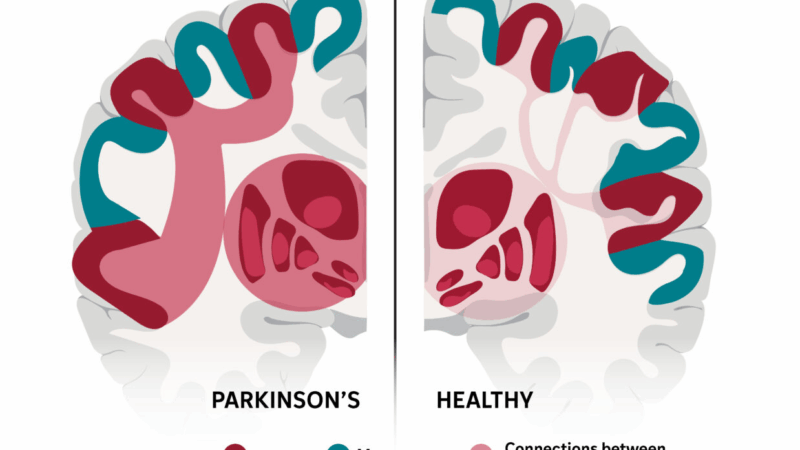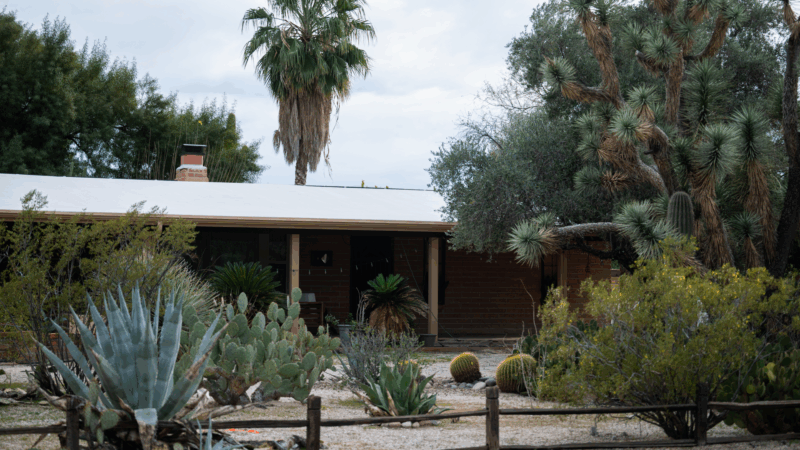Virginia is for … data centers? Residents are increasingly saying no
CHESAPEAKE, Va. — The two dozen or so nondescript gray, white and blue buildings lining Virginia State Route 625 could be large warehouses.
But community activist Elena Schlossberg can identify them literally a mile away by their telltale rows of backup diesel generators. The buildings are data centers.
“We’re sort of that model of how not to do this kind of development,” says Schlossberg.
All internet data goes through facilities like these: massive, sometimes multistoried warehouses filled with servers where every webpage and shred of data lives. Demand for these centers has skyrocketed in the last two years as artificial intelligence usage has gone mainstream.
Virginia is a data hot spot. It has the world’s highest concentration of data centers — nearly 600 facilities of varying sizes, including roughly 150 of the largest kind, known as hyperscale data centers. Not all residents are happy about that.
A demand for power and water
As data centers have cropped up alongside residential developments, they have become synonymous with intensive power and water consumption, as well as round-the-clock noise from cooling systems.
A decade ago, Schlossberg learned Amazon Web Services was building a huge data center, the equivalent of more than seven football fields, next to her home in Northern Virginia, and she threw herself into stopping it — unsuccessfully.
“And the data industry came and crushed us,” she said.
Amazon is one of several companies that have made Northern Virginia an epicenter for data: 13% of the world’s data center operational capacity is here.
And the demand for data is growing with the proliferation of AI applications like ChatGPT. There are plans for 70 more data centers in Virginia, many the size of multiple football fields.
If built, they’ll consume so much power that the state’s main utility company, Dominion, is contracted to build 40 gigawatts of new energy capacity for these new centers — that’s nearly three times the state’s current maximum power production.
“To increase it by 40 gigawatts is to almost triple our entire grid for one industry … and to do that for one industry is absolutely unprecedented,” said Julie Bolthouse of the Piedmont Environmental Council, a Virginia environment nonprofit.
Dan Diorio, the vice president for state policy at the national Data Center Coalition, a trade group that represents developers and operators behind the centers, said the centers support everything people do online, from the banking app on your phone to storing electronic medical records to running 911 call centers. And the need for them is only growing.
“The data center industry is building out as quickly as they can to meet that growth and provide the digital services that we all rely on every day. And so far, we’re still behind,” Diorio said.
Diorio said regulation of future data centers should balance residents’ worries with the economic impact of development — $24 billion in capital investments in Virginia just last year.
“Not every project is the same, but I think as an industry we’re responsive and responsible members of the community when proposing these projects [and] working to address those community concerns,” Diorio said.
The rise of a NIMBY movement
Concerns about power and land use, as well as the cost of these data centers, have galvanized not just those worried about the environment but also a widespread not-in-my-backyard movement against them.
And Schlossberg has become the go-to person for how to organize. She reels off the places she has gotten calls from: “I’ve talked to people in Boardman, Oregon; Peculiar, Missouri; Fort Wayne, Indiana; Maryland; Georgia.”
One of those places is Chesapeake, in Virginia’s coastal southeast. Residents of this city of 250,000 learned of a proposed data center project just weeks ago, and they were concerned.
Helen Messer’s Chesapeake house backs up to a small water-retention pond. On the other side of that pond, a couple of hundred feet away, is the proposed data center site.
She’s most worried about the possibility of constant noise from the center’s cooling systems, which typically run around the clock to keep servers from overheating.
“How am I going to relax with something buzzing at me 24/7?” she asked.
Within days of the proposal going public, Chesapeake residents held a meeting at a church social hall to prepare their resistance. A representative from the state’s Sierra Club chapter answered questions about data centers elsewhere as residents worried over water usage, pollution and, of course, noise.
The developer behind the data project, Doug Fuller, also showed up.
He got a less-than-warm welcome from residents, including Messer.
“Why can’t we move the data center to your neighborhood?” she shouted, to a smattering of applause.
Fuller pushed back, arguing the facility would be a net positive for Chesapeake.
“As a developer, I’ll create an asset for our city. Tax revenues will be in the millions of dollars,” he told an unconvinced crowd.
Fuller also said his effort would help capitalize on a major government investment. For the last couple of decades, cities and counties in southeastern Virginia have struggled to diversify their economies away from tourism and shipbuilding. In the last couple of years, several of these municipalities got together and spent tens of millions of dollars on high-speed fiber-optic networks in hopes of attracting high-tech businesses like data centers.

Still, hundreds of Chesapeake residents implored local leaders by email and in person to deny the proposal.
Resident Lee DaMore, who lives a few blocks from where the data center was proposed, put up red “No Data Center” signs around his neighborhood ahead of a City Council meeting in June.
“Once they’re built, there’s nothing you can do. There’s nothing you can do. If they violate the decibels, what are you going to do? Fine them $1,000? That’d be like me asking you for a penny. Seriously, once this thing is built, it’s all over but the crying,” DaMore said.
DaMore and the rest of the anti-data center opposition showed up in force to the council meeting, speaking one after the other against the data center for more than two hours.
“I think there are viable areas this could go in our city and could flourish in our city, but I don’t think anything near a residential area is [viable],” Chesapeake City Council Member Amanda Newins said ahead of the vote.

When the tallying board lit up to show a unanimous vote blocking the data center, the council chamber erupted with cheers.
Messer and her neighbors were giddy as they poured out of city hall.
“I’ll sleep better than I have for a month,” she said.
As resistance has mounted nationwide, more data center projects are being delayed or outright rejected — 16 projects nationally between May of last year and this past March, according to a study by nonprofit Data Center Watch.
But a central tension remains: The use of AI applications is skyrocketing. And the data centers to handle all of that have to go somewhere.
Transcript:
AILSA CHANG, HOST:
When you use AI like ChatGPT, or even when you Google something, your search is routed through a data center. These are giant warehouses for servers and data storage. And the world’s highest concentration of data centers is in Virginia. But residents there are not happy about that. NPR’s Emily Feng and Ryan Murphy from member station WHRO have this story.
AUTOMATED VOICE: In 600 feet, turn right.
EMILY FENG, BYLINE: I’m going down one of the major interstate highways that crisscross northern Virginia. And driving with me is Elena Schlossberg, a data center opponent.
ELENA SCHLOSSBERG: Can you see the…
FENG: This big gray building?
SCHLOSSBERG: Yeah.
FENG: She’s pointing out the huge data centers on both sides of the highway.
SCHLOSSBERG: We’re sort of that model of how not to do this kind of industrial development.
FENG: A decade ago, Schlossberg learned Amazon Web Services was building a data center next to her home in northern Virginia. And she threw herself into stopping it.
SCHLOSSBERG: And the data center industry came and crushed us.
FENG: Amazon is among NPR’s recent financial supporters and pays to distribute some NPR content. And they’re one of several companies that have made Virginia an epicenter for data. Thirteen percent of all data centers in the world are here. That’s been supercharged by AI products like ChatGPT that need computing power.
(SOUNDBITE OF TOOL BANGING)
FENG: So about 70 more data centers, many the size of multiple football fields, are planned in Virginia. The centers support our computing needs. They also need huge amounts of water and energy for cooling. In Virginia, one utility company alone, called Dominion, is contracted to build 40 gigawatts of energy capacity for these new centers. Julie Bolthouse at the Piedmont Environmental Council, a Virginia environment nonprofit, explains what that figure means.
JULIE BOLTHOUSE: To increase it by 40 gigawatts is to almost triple our entire grid for one industry. And to do that for one industry is absolutely unprecedented.
FENG: Triple the max power production currently for the entire state. The power, the land and the cost of these data centers has galvanized a not-in-my-backyard movement against them. And many activists around the country are seeking out Schlossberg about how to organize.
SCHLOSSBERG: I’ve talked to people in Boardman, Oregon. Peculiar, Missouri. Fort Wayne, Indiana. Maryland. Georgia.
FENG: One of the communities that recently came to her is in Chesapeake, Virginia, where my colleague, Ryan Murphy, has been attending town hall meetings.
RYAN MURPHY, BYLINE: Residents here learned of a proposed data center project just a few weeks ago, and they were concerned. Helen Messer’s house is a couple hundred feet from where the data center would go. She’s most worried about the very loud noise emitted by large-scale data centers.
HELEN MESSER: How am I going to relax with something buzzing at me 24/7?
MURPHY: Within days, Chesapeake residents held a meeting at a church social hall to prepare their resistance. The developer behind the data project, Doug Fuller, also showed up unexpectedly. He got a less than warm welcome from residents…
MESSER: How does this benefit our hearing? How does this benefit…
UNIDENTIFIED PERSON #1: How does this benefit pollution?
MESSER: Pollution.
MURPHY: …Including Messer.
MESSER: Why can’t we move the data centers to your neighborhood?
MURPHY: Fuller pushed back.
DOUG FULLER: Me as a developer will create an asset for our city. Tax revenues will be in the millions of dollars.
MURPHY: Local governments in southeastern Virginia have been trying to shift their economies away from tourism and shipbuilding. They’ve spent tens of millions of dollars on high-speed fiber optic networks in hopes of attracting high-tech businesses like data centers. Still, hundreds of residents implored local leaders to deny the proposal. Here’s resident Lee DaMore (ph).
LEE DAMORE: Once they’re built, there’s nothing you can do, there’s nothing you can do. If they violate the decibels, what are you going to do, fine them $1,000? You know, that’d be like me asking you for a penny. I mean, seriously. Once this thing is built, it’s all over but the crying.
MURPHY: Opponents showed up in force to a June city council meeting.
(SOUNDBITE OF ARCHIVED RECORDING)
UNIDENTIFIED PERSON #2: Thank you. Members of council, please prepare to vote. Please vote, and Madam Clerk, record.
MURPHY: When the tallying board lit up to show a unanimous vote blocking the data center, the council chamber erupted.
(CHEERING)
MURPHY: Messer and her neighbors were giddy as they poured out of city hall.
MESSER: I will sleep better than I have slept for in months.
MURPHY: As resistance has mounted and gotten organized, more data center projects are being delayed or outright rejected – 16 projects nationally between May of last year and this past March. But a central tension remains. Use of AI applications is skyrocketing, and the data centers to handle all of that have to go somewhere.
For NPR, I’m Ryan Murphy.
FENG: And I’m NPR’s Emily Feng.
This complex brain network may explain many of Parkinson’s stranger symptoms
Parkinson's disease appears to disrupt a brain network involved in everything from movement to memory.
How the use of AI and ‘deepfakes’ play a role in the search for Nancy Guthrie
As artificial intelligence becomes more advanced and commonplace, it can be difficult to know what's real and what's not, which has complicated the search for Nancy Guthrie, according to law enforcement. But just how difficult is it?
Hospitals are posting prices for patients. It’s mostly industry using the data
The Trump administration pushed for price transparency in health care. But instead of patients shopping for services, it's mostly health systems and insurers using the information for negotiations.
‘E-bike for your feet’: How bionic sneakers could change human mobility
Nike's battery-powered footwear system, which propels wearers forward, is part of a broader push to help humans move farther and faster.
Immigration officials to testify before House as DHS funding deadline approaches
Congressional Democrats have a list of demands to reform Immigration and Customs Enforcement. But tensions between the two parties are high and the timeline is short – the stopgap bill funding DHS runs out Friday.
Mikaela Shiffrin set to ski for the first time in the Olympics in team combined event
The team combined event pairs a downhill skier with a slalom skier. The top U.S. duo — the slalom star Shiffrin and Breezy Johnson, who won gold in the downhill on Sunday — is a medal favorite.








